Bolivia: Opposition blockades push for leader's release
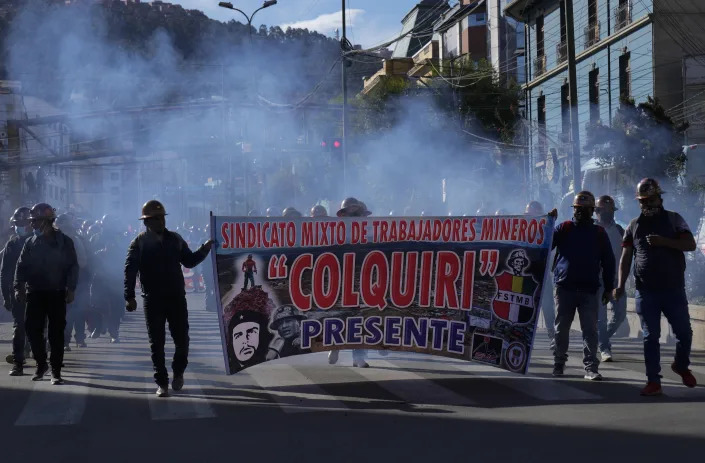
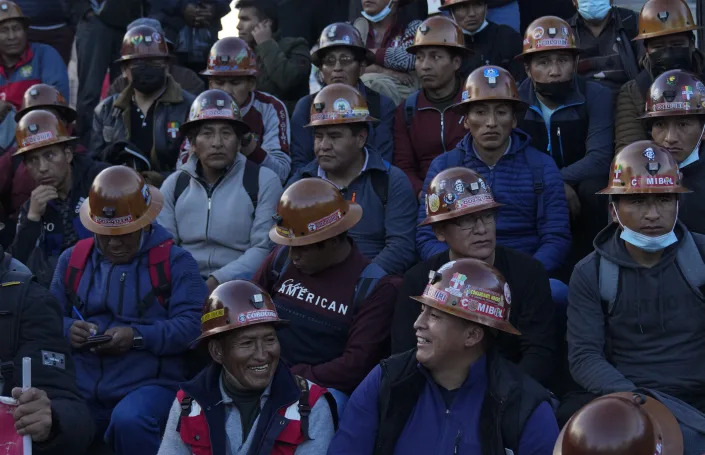
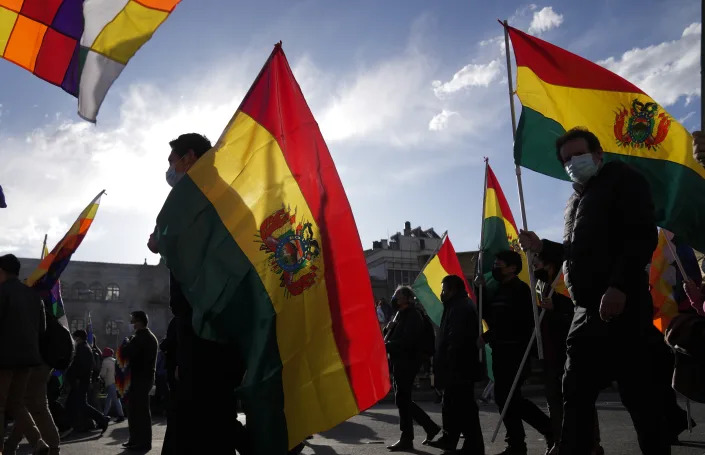
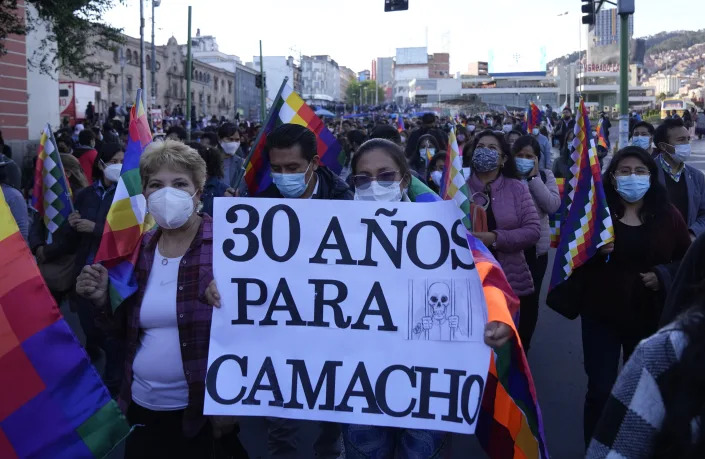
Demonstrators hold a sign demanding jail time for opposition leader and governor of Santa Cruz region Luis Fernando Camacho during a march in La Paz, Bolivia, Thursday, Jan. 12, 2023. Prosecutors on Dec. 29 remanded Camacho into custody for four months while he faces terrorism charges.
(AP Photo/Juan Karita)
DANIEL POLITI
Thu, January 12, 2023
SAN CARLOS, Bolivia (AP) — Outside Santa Cruz, Bolivia's most populous city, the highway starts to resemble a parking lot with dozens of cargo-laden trucks stopped in a long line as exhausted-looking drivers wait by the side of the road. Wet clothing hangs from the windows of some trucks.
The vehicles are blocked by large mounds of sand piled on the highway as it passes through the town of San Carlos, 68 miles (110 kilometers) from Santa Cruz. No cars or trucks pass the mounds, only motorcycles transporting people.
“This measure is to make the government realize that they can’t live without Santa Cruz,” said Micol Paz, a 32-year-old activist with Santa Cruz Gov. Luis Fernando Camacho's Creemos political party.
The detention on terrorism charges in December of Camacho, the country's most prominent opposition leader, sparked a series of protests in this eastern region that is Bolivia's economic engine and farming hub. Road blockades demanding his release, like the one in San Carlos, have thrown the distribution chain into chaos, caused prices to surge and worsened tensions between the leftist government in capital of La Paz and right-wing opposition based in Santa Cruz.
Camacho's arrest stems from the protests that led to the 2019 resignation of then-President Evo Morales. Morales's party, which has since returned to power, accuses Camacho of orchestrating the protests and calls them a coup. The unrest resulted in 37 deaths,
Camacho's supporters say the protests were a legitimate response to fraudulent elections that were set to keep Morales in power and that his arrest constitutes a kidnapping.
The governor, who placed third in Bolivia’s 2020 presidential election, is spending his days in a maximum security prison outside La Paz after a judge ordered him held for four months of pretrial detention, agreeing with prosecutors that he was a flight risk.
Caught in the middle of the dispute are the truckers and consumers hit by rising prices.
Edgar Quispe Solares was visibly angry as he sat in his semi-trailer that was transporting cars.
“We’ve been without basic services for a week. We can't shower, we can't buy anything,” Quispe, 47, said while he anxiously watched activists apparently getting ready to move the blockade to a nearby town, a sign he might be able to move his trailer for the first time in eight days.
Rómulo Calvo, the head of the powerful Civic Committee for Santa Cruz that called for the blockades, says that while the protests are to continue until Camacho's release he can’t guarantee that that will really happen.
“The blockades will last for as long as people who are taking the action can continue,” Calvo said, acknowledging there is fatigue after a 36-day strike against the government last fall to demand a national census that would likely give the region more tax revenue and legislative representation.
Santa Cruz plays an outsized role in Bolivia’s economy, making up around one-third of its economic activity while 70% of the country's food comes out of the eastern region that is the center of agribusiness.
“Santa Cruz is a fundamental bastion of the Bolivian economy and that is why it has the power to flex its muscles against the government,” Jaime Dunn, an economic analyst in La Paz, said.
It’s difficult to quantify the direct economic effect of the protests, in part because some trucks are managing to skirt the blockades.
“You won’t necessarily see the impact monetized in terms of amounts, but you will in prices and diminishing Central Bank reserves,” Dunn said.
In markets in La Paz, customers are sparse as the price of chicken has soared 29% while beef increased 8% since the blockade started, according to Marina Quisbert, a leader in a grouping of butchers at the Rodríguez Market.
It isn’t just meat.
“Even the prices of vegetables have increased, if I used to spend 100 pesos, now I have to spend 120,” said Rubén Mendoza, a 65-year-old retired teacher.
The administration of leftist President Luis Arce has played down talk of the economic impact of the blockades with Economy Minister Marcelo Montenegro telling journalists this week that prices have increased due to “speculation and profiteering.”
Amid the discussion over how the blockades could affect the economy, thousands took to the streets in the capital cities of eight of the country’s nine regions on Tuesday to demand the release of Camacho as well as other opposition leaders who have been imprisoned. Smaller counter-protests supporting his detention also took place.
“I feel impotence more than anything, because any of us could be sent to jail for not agreeing with the government,” Karine Flores Mendez, a 49-year-old executive assistant, said as she joined protesters in Santa Cruz.
Some also spoke out against law enforcement officers who have clashed with protesters during the frequent nightly demonstrations in downtown Santa Cruz.
“They send police to tear gas us,” Pablo Vaca, a 37-year-old retail worker, said.
Arce's administration has accused the nightly protesters of fomenting violence and burning vehicles as well as public offices.
Some people who agree with the aim of the protests say the blockades go too far, including Elvis Velázquez, a doctor who lives near San Carlos and works in Yapacani, around 65 kilometers (40 miles) away. He is affected by the highway closure.
“I support some measures but the blockades aren't productive because they paralyze us as citizens,” Velázquez said as he rushed to board a minivan to Yapacani after crossing the blockade on foot. “They cut us off from each other."
————-
Associated Press Journalist Paola Flores contributed from La Paz, Bolivia.
Bolivia's farm hub battles political capital over cattle and grains

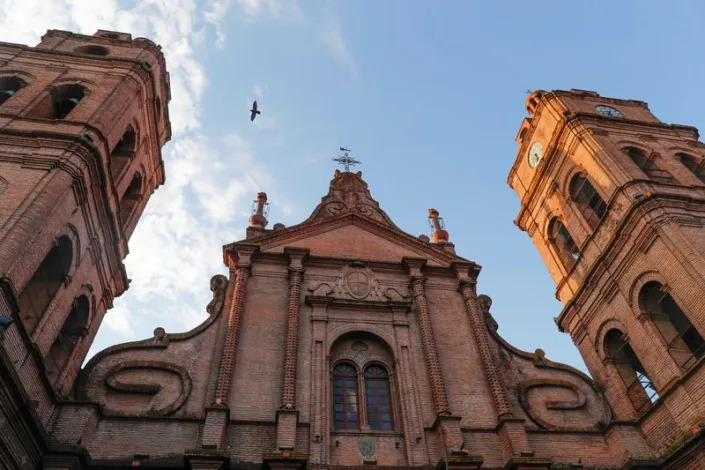
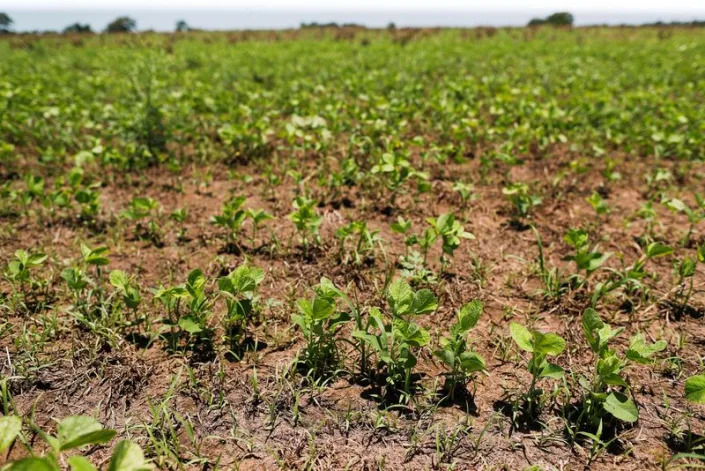
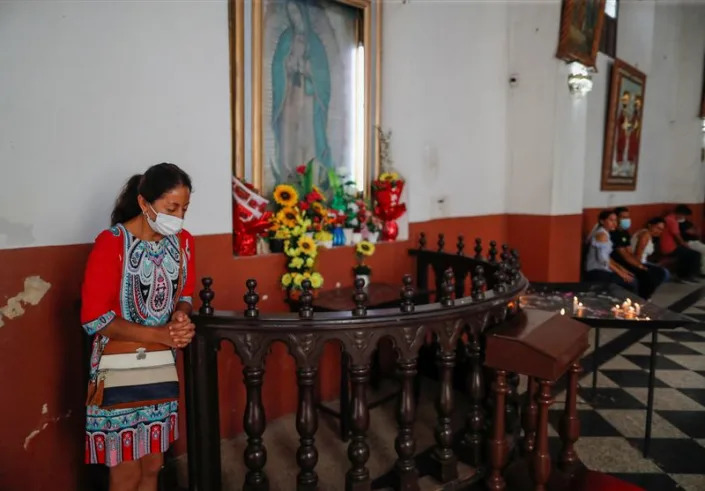
Bolivia's Santa Cruz in cold war with La Paz over cattle and grains
Thu, January 12, 2023
By Agustin Marcarian and Monica Machicao
PAILAS, Bolivia (Reuters) - Javier Monasterio, a rancher in Bolivia's lowland area of Santa Cruz, is feeling the economic hit of weeks-long protests and blockades since the dramatic arrest of the region's governor that has snarled domestic transport of grains and meat.
The tensions were sparked by the arrest of Santa Cruz's local elected leader Luis Camacho last month over an alleged coup in 2019 against then-President Evo Morales, a complex period of Bolivia's history that sharply divides opinion.
Protests against the central government have seen buildings and cars burned, while blockades have prevented transport of food and grains from the key producing region, a bid by local leaders to pressure La Paz by squeezing domestic supply.
The tension has seen Monasterio's plans to double the number of cattle on his farm put on hold, but he remains resolute that the region needs to fight back against what many locally see as a political attack by La Paz.
"This affects us because a good part of our production goes to markets in the interior," Monasterio told Reuters at his farm, adding though that he respected the "popular movement" that he hoped would bring longer-term benefits to the country.
"It's worth the sacrifice, it's worth suffering, it's worth it even in these difficult times... we're going to win."
The tensions underscore a sharpening of a deep-seated rivalry between Santa Cruz and La Paz - Bolivia's farming hub and the political capital respectively - that have long butted heads over politics and resources.
Santa Cruz is a conservative, Catholic region with a significant white European descent community. La Paz is an Andean stronghold with a large indigenous population that has traditionally titled towards the ruling socialist MAS party.
The government in La Paz says the arrest of Camacho was justice for stirring up protests as a civic leader in 2019 that led to the resignation of Morales under widespread pressure and ushered in a divisive interim right-wing government. Camacho denies the charges.
After winning 2020 elections, Morales' MAS party, now headed by his former economy chief Luis Arce, returned to office and has gone after rivals, including Camacho and interim president Jeanine Anez, also currently in jail.
Economy Minister Marcelo Montenegro said Santa Cruz would struggle to put pressure on the capital, arguing that while it was a key food producer, other regions could take the slack and that it needed state fuel subsidies and domestic buyers.
"They can't resist on their own", said Montenegro, adding the rising economic pressures would force Santa Cruz producers to re-start supply within the country.
"It is a very complex bet. What we understand is that there is an economic rationality, but well, we don't see it being that strong. They are going to have to somehow go back to depending on national consumption."
The stand-off between the two cities has sparked calls in Santa Cruz for a federal model to gain more autonomy and some more extreme groups demanding independence. Many still remain determined to keep protests going.
"We are going to rise up to our faith," said Victor Hugo, at a church in Santa Cruz, a region where Christian iconography is prominent from the streets to offices of local civic groups.
"The situation is critical for each one of us, but I am with this fight, I prefer to fight today and live calmly tomorrow. Every Santa Cruz person has to fight, all Bolivians must fight for the well-being of Bolivia, for freedom."
(Reporting by Agustin Marcarian and Monica Machicao; Editing by Adam Jourdan and Marguerita Choy)
DANIEL POLITI
Thu, January 12, 2023
SAN CARLOS, Bolivia (AP) — Outside Santa Cruz, Bolivia's most populous city, the highway starts to resemble a parking lot with dozens of cargo-laden trucks stopped in a long line as exhausted-looking drivers wait by the side of the road. Wet clothing hangs from the windows of some trucks.
The vehicles are blocked by large mounds of sand piled on the highway as it passes through the town of San Carlos, 68 miles (110 kilometers) from Santa Cruz. No cars or trucks pass the mounds, only motorcycles transporting people.
“This measure is to make the government realize that they can’t live without Santa Cruz,” said Micol Paz, a 32-year-old activist with Santa Cruz Gov. Luis Fernando Camacho's Creemos political party.
The detention on terrorism charges in December of Camacho, the country's most prominent opposition leader, sparked a series of protests in this eastern region that is Bolivia's economic engine and farming hub. Road blockades demanding his release, like the one in San Carlos, have thrown the distribution chain into chaos, caused prices to surge and worsened tensions between the leftist government in capital of La Paz and right-wing opposition based in Santa Cruz.
Camacho's arrest stems from the protests that led to the 2019 resignation of then-President Evo Morales. Morales's party, which has since returned to power, accuses Camacho of orchestrating the protests and calls them a coup. The unrest resulted in 37 deaths,
Camacho's supporters say the protests were a legitimate response to fraudulent elections that were set to keep Morales in power and that his arrest constitutes a kidnapping.
The governor, who placed third in Bolivia’s 2020 presidential election, is spending his days in a maximum security prison outside La Paz after a judge ordered him held for four months of pretrial detention, agreeing with prosecutors that he was a flight risk.
Caught in the middle of the dispute are the truckers and consumers hit by rising prices.
Edgar Quispe Solares was visibly angry as he sat in his semi-trailer that was transporting cars.
“We’ve been without basic services for a week. We can't shower, we can't buy anything,” Quispe, 47, said while he anxiously watched activists apparently getting ready to move the blockade to a nearby town, a sign he might be able to move his trailer for the first time in eight days.
Rómulo Calvo, the head of the powerful Civic Committee for Santa Cruz that called for the blockades, says that while the protests are to continue until Camacho's release he can’t guarantee that that will really happen.
“The blockades will last for as long as people who are taking the action can continue,” Calvo said, acknowledging there is fatigue after a 36-day strike against the government last fall to demand a national census that would likely give the region more tax revenue and legislative representation.
Santa Cruz plays an outsized role in Bolivia’s economy, making up around one-third of its economic activity while 70% of the country's food comes out of the eastern region that is the center of agribusiness.
“Santa Cruz is a fundamental bastion of the Bolivian economy and that is why it has the power to flex its muscles against the government,” Jaime Dunn, an economic analyst in La Paz, said.
It’s difficult to quantify the direct economic effect of the protests, in part because some trucks are managing to skirt the blockades.
“You won’t necessarily see the impact monetized in terms of amounts, but you will in prices and diminishing Central Bank reserves,” Dunn said.
In markets in La Paz, customers are sparse as the price of chicken has soared 29% while beef increased 8% since the blockade started, according to Marina Quisbert, a leader in a grouping of butchers at the Rodríguez Market.
It isn’t just meat.
“Even the prices of vegetables have increased, if I used to spend 100 pesos, now I have to spend 120,” said Rubén Mendoza, a 65-year-old retired teacher.
The administration of leftist President Luis Arce has played down talk of the economic impact of the blockades with Economy Minister Marcelo Montenegro telling journalists this week that prices have increased due to “speculation and profiteering.”
Amid the discussion over how the blockades could affect the economy, thousands took to the streets in the capital cities of eight of the country’s nine regions on Tuesday to demand the release of Camacho as well as other opposition leaders who have been imprisoned. Smaller counter-protests supporting his detention also took place.
“I feel impotence more than anything, because any of us could be sent to jail for not agreeing with the government,” Karine Flores Mendez, a 49-year-old executive assistant, said as she joined protesters in Santa Cruz.
Some also spoke out against law enforcement officers who have clashed with protesters during the frequent nightly demonstrations in downtown Santa Cruz.
“They send police to tear gas us,” Pablo Vaca, a 37-year-old retail worker, said.
Arce's administration has accused the nightly protesters of fomenting violence and burning vehicles as well as public offices.
Some people who agree with the aim of the protests say the blockades go too far, including Elvis Velázquez, a doctor who lives near San Carlos and works in Yapacani, around 65 kilometers (40 miles) away. He is affected by the highway closure.
“I support some measures but the blockades aren't productive because they paralyze us as citizens,” Velázquez said as he rushed to board a minivan to Yapacani after crossing the blockade on foot. “They cut us off from each other."
————-
Associated Press Journalist Paola Flores contributed from La Paz, Bolivia.
Bolivia's farm hub battles political capital over cattle and grains




Bolivia's Santa Cruz in cold war with La Paz over cattle and grains
Thu, January 12, 2023
By Agustin Marcarian and Monica Machicao
PAILAS, Bolivia (Reuters) - Javier Monasterio, a rancher in Bolivia's lowland area of Santa Cruz, is feeling the economic hit of weeks-long protests and blockades since the dramatic arrest of the region's governor that has snarled domestic transport of grains and meat.
The tensions were sparked by the arrest of Santa Cruz's local elected leader Luis Camacho last month over an alleged coup in 2019 against then-President Evo Morales, a complex period of Bolivia's history that sharply divides opinion.
Protests against the central government have seen buildings and cars burned, while blockades have prevented transport of food and grains from the key producing region, a bid by local leaders to pressure La Paz by squeezing domestic supply.
The tension has seen Monasterio's plans to double the number of cattle on his farm put on hold, but he remains resolute that the region needs to fight back against what many locally see as a political attack by La Paz.
"This affects us because a good part of our production goes to markets in the interior," Monasterio told Reuters at his farm, adding though that he respected the "popular movement" that he hoped would bring longer-term benefits to the country.
"It's worth the sacrifice, it's worth suffering, it's worth it even in these difficult times... we're going to win."
The tensions underscore a sharpening of a deep-seated rivalry between Santa Cruz and La Paz - Bolivia's farming hub and the political capital respectively - that have long butted heads over politics and resources.
Santa Cruz is a conservative, Catholic region with a significant white European descent community. La Paz is an Andean stronghold with a large indigenous population that has traditionally titled towards the ruling socialist MAS party.
The government in La Paz says the arrest of Camacho was justice for stirring up protests as a civic leader in 2019 that led to the resignation of Morales under widespread pressure and ushered in a divisive interim right-wing government. Camacho denies the charges.
After winning 2020 elections, Morales' MAS party, now headed by his former economy chief Luis Arce, returned to office and has gone after rivals, including Camacho and interim president Jeanine Anez, also currently in jail.
Economy Minister Marcelo Montenegro said Santa Cruz would struggle to put pressure on the capital, arguing that while it was a key food producer, other regions could take the slack and that it needed state fuel subsidies and domestic buyers.
"They can't resist on their own", said Montenegro, adding the rising economic pressures would force Santa Cruz producers to re-start supply within the country.
"It is a very complex bet. What we understand is that there is an economic rationality, but well, we don't see it being that strong. They are going to have to somehow go back to depending on national consumption."
The stand-off between the two cities has sparked calls in Santa Cruz for a federal model to gain more autonomy and some more extreme groups demanding independence. Many still remain determined to keep protests going.
"We are going to rise up to our faith," said Victor Hugo, at a church in Santa Cruz, a region where Christian iconography is prominent from the streets to offices of local civic groups.
"The situation is critical for each one of us, but I am with this fight, I prefer to fight today and live calmly tomorrow. Every Santa Cruz person has to fight, all Bolivians must fight for the well-being of Bolivia, for freedom."
(Reporting by Agustin Marcarian and Monica Machicao; Editing by Adam Jourdan and Marguerita Choy)
No comments:
Post a Comment